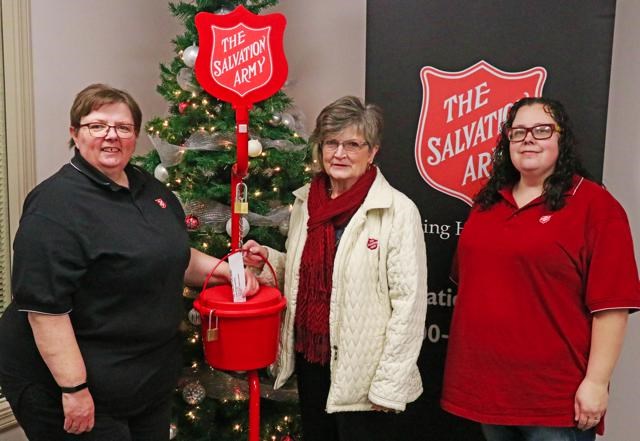Helen Orsted is in her 10th year as a volunteer for the Salvation Army, helping to coordinate their annual kettle campaign in Weyburn, and she shared some of her thoughts on that position with the members of the Weyburn Rotary Club on Thursday. In the photo above, she is shown in the centre, along with Jennifer Lorinczy, Weyburn coordinator of community ministries (at right), and Ronza Reynard, left, director of community ministries for Estevan and Weyburn.
Her job may seem daunting at times, as she has to fill 260 two-hour time slots for four locations in the city, which works out to 20 spaces a day, with enough volunteers.
Her goal 10 years ago when she started was to raise $10,000, and this year her goal is for the kettles to raise $30,000, which goes towards supporting the programs organized and run by the Salvation Army for their clients in the Weyburn area.
“The need has not diminished,” said Orsted, noting that there are also many acts of charity done anonymously to help people out. As one example, in the first week the kettles were up, a kettle received a folded up bundle of bills, totaling about $180, with no note or request for a receipt.
“I’m still trying to inspire people to volunteer and fill all the spots. It gets a little easier every year,” said Orsted.
One major change has added to the challenge, however, as she noted when she began she had the support of officers in charge of the Weyburn Salvation Army church, but now there are no officers for either Weyburn or Estevan — but as she pointed out, the needs are still there for the food bank and for the other programs.
Historically, the sounds of bells at the kettles began in Canada in 1906 in St. John, Newfoundland, and have continued to this day, helping the Salvation Army to offer hope to those who need it.
Currently, the food bank hands out around 30 hampers a week to those in need, so there is a strong ongoing need for this ministry to continue.
“A food hamper could be the hope they need when they’re on the edge of darkness,” said Orsted. “Standing at a kettle is about extending care to those who need it.”
She said other than a couple of spots she had to fill for the next day, she has her schedule for the kettles filled right up to Christmas Eve day.
“When I get my lists of people to help, that is an uplifting thing for me,” said Orsted, thanking the Rotary members for the help they have extended in volunteering, and for their adoption of a family to support at Christmas time.
Asked how the kettle campaign did last year, she noted they were able to raise some $40,000 last year.
“It all goes into the same pot. If you put a cheque into the kettle, it doesn’t mean that it doesn’t go the same place,” added Orsted.
Asked what times of the year are worse for need, she said the food bank supplies get fairly low in the summertime, but added she doesn’t see the whole picture in terms of the needs year-round.




